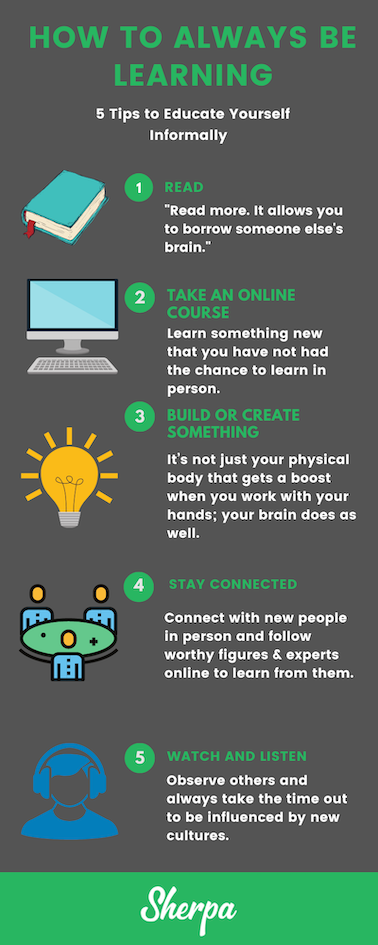5 Tips to Become a Lifelong Learner
 |
After completion of studying at school or finishing a university degree most people drastically reduce the number of books they read. Some studies have found that 80% of the books purchased on Amazon are bought for gifts rather than personal consumption. Children nowadays have access to far more technology and other entertainment that, for many, reading books has fallen by the wayside.
Many education systems have been criticised for not preparing students for life in the real world. Informal education is the spontaneous process of cultivating learning, it works through conversation and the exploration of new ideas and experiences.
When you stop learning, you stop growing. With these 5 tips you will be able to consistently better yourself and learn by doing.
1. Read
Everything you read fills your head with new bits of information, and you never know when it might come in handy. The more knowledge you have, the better-equipped you are to tackle any challenge you’ll ever face.
In the same way that musicians influence one another and painters use techniques established by previous masters, so do writers learn how to craft prose by reading the works of others. If you want to be a prolific writer, become a voracious reader. Every book you read adds to the foundation of your informal education.
2. Online Learning
There’s no shortage of worthwhile opportunities to learn from the internet. And it beats the temporary thrill of stupid memes and cat videos. Online courses nowadays are plentiful with new ideas popping up all over the place.
Take Sherpa for example, an online tuition platform that is right at the forefront of education and technology. It offers school children and adults the chance to be tutored online by experts in dozens of different topic areas. With hundreds of qualified teachers all experienced in tutoring their field, there are huge possibilities to learn skills that you might not conventionally get the opportunity to learn within your school or university.
3. Build or Make Something
While consumption causes us to learn, creation gives us the opportunity for a practical application of whatever we have learned.
Research has shown that hand activity from knitting to woodworking to growing vegetables or chopping them are useful for decreasing stress, relieving anxiety, and modifying depression. One can be moved or transformed by a thought or idea along the way as well as by the endpoint.
4. Connect
The internet has given us access to the thoughts and ideas of some society’s greatest minds.
- Follow your heroes and role models on twitter. You’ll learn what books they read, what news they think is important, and much more.
- Don’t limit yourself to the internet. Connect in real life, actively meet and converse with people you may not have ordinarily come across, share their knowledge and learn from it.
As Benjamin P. Hardy said, surround yourself with people who hold you to a higher standard.
5. Listen and Watch
Listen to podcasts. Watch TED talks. Between iTunes and YouTube, you have a fountain of knowledge that could last you a lifetime. There’s a podcast or YouTube channel for virtually any subject you might be interested in.
School might be where your formal education ends, but it shouldn’t be the place where learning does. Make a commitment to lifelong learning and you’ll give yourself an informal education that beats your formal one.





Comments
Post a Comment